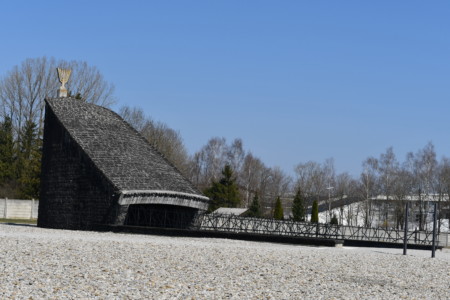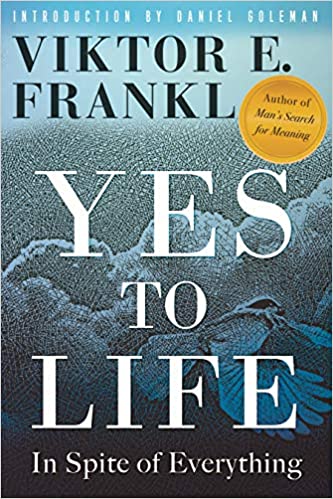Can a book originally published in German in the aftermath of the Holocaust provide relevant inspiration for people coming to terms with the ramifications of the COVID-19 pandemic? After finishing the book, I answer, “yes.”
Dr. Viktor E. Frankl, a Jewish survivor of multiple concentration camps, wrote Yes to Life: In Spite of Everything after delivering a series of three lectures less than a year after being liberated. Recently, the book was published for the first time in English.
Frankl (1905-1997) was a distinguished Austrian neurologist and psychiatrist who founded the Third Viennese School of Psychotherapy and authored books including the bestseller, Man’s Search for Meaning. Decades ago, I read this remarkable work while pursuing my undergraduate degree in Jewish Studies. Now, I am inclined to reread the book to see how it addresses our current issues.
The Yes to Life’s thin book jacket should not mislead readers. Frankl’s erudite and concise analysis provides tremendous insight into how people react and respond to adversity. As someone who was born after World War II, it is impossible to step into the shoes of someone who was subjected to the inhumane and abhorrent conditions during the Shoah.

By reading survivors’ words, touring Holocaust and Jewish museums throughout the world, and visiting concentration camps, I absorb the lessons learned from this horrendous period of history. Yes to Life: In Spite of Everything adds another layer to my comprehension. Frankl’s words, “…in the camp we ourselves were nothing, we were already dead during our lifetime,” (page 100) is a powerful statement few can forget.
Daniel Goleman, a psychologist who co-founded the Collaborative for Academic, Social, and Emotional Learning and the co-directs the Consortium for Research on Emotional Intelligence in Organizations, introduces the book and provides a comprehensive overview putting the book into a modern perspective. Decades after Frankl’s death, Goleman shows readers how Frankl’s ideas written in the 1940s are still relevant today.
After surviving unimaginable evil, I remain inspired by Frankl’s ability to offer hope in a postwar era filled with pessimism and skepticism. Stripped of his pre-war existence, he persevered in a scenario filled with indifference and found a way to simply exist until his confinement ended. He was unwilling to give up his fight to survive. After his liberation, Frankl candidly offered his thoughts on the meaningful aspects of life.
The past few years have certainly disenchanted us, but they have also shown us that what is human is still valid; they have taught us that it is all a question of the individual human being. After all, in the end, what was left was the human being! Because it was the human being that survived amid all the filth of the recent past. and equally it was the human being that was left in the experiences of the concentration camps. (Page 25-26)
The restrictions imposed by the COVID-19 pandemic have undoubtedly put a damper on pleasurable experiences by limiting joyful events. Frankl points out why pleasure does not go hand in hand with a meaningful life.
Pleasure in itself cannot give us meaning; thus the lack of pleasure cannot take away meaning from life, which now seems obvious to us. (Page 31)
Frankl also uses Kierkegaard’s parable to illustrate how it is not wise to chase after happiness.
In any case, all human striving for happiness, in this sense, is doomed to failure as luck can only fall into one’s lap but can never be hunted down. It was Kierkegaard who told the wise parable that the door to happiness always opens ‘outward,’ which means it closes itself precisely against the person who tries to push the door to happiness ‘inward,’ so to speak. (Page 32)
When counseling a tailor assistant about the meaning of life, one sees Frankl’s view that all individuals have unique purposes that they fulfill by their daily tasks.
…it is only a matter of how he fills his place, his circle. Whether a life is fulfilled doesn’t depend on how great one’s range of action is, but rather only whether the circle is filled out. (page 36)
When it comes to the idea of fate, Frankl argues that it is best to accept one’s predicament.
Those who rebel against their fate—that is, against circumstances that cannot help and which they certainly cannot change—have not grasped the meaning of fate. Fate really is integral in the totality of our lives; and note even the smallest part of what is destined can be broken away from this totality without destroying the whole, the configuration of our existence.
So, fate is part of our lives and so is suffering: therefore, it life has meaning, suffering also has meaning. Page 40
An unknown number of Holocaust victims chose suicide over life. For Frankl, “suicide is never able to solve a problem.” Page 41 By acknowledging that death is a part of life, he suggests that people should live life to its fullest by taking control of each precious moment and recognizing their personal imperfections and uniqueness.
What we ‘radiate’ into the world, the ‘waves’ that emanate from our being, that is what will remain of us when our being itself has long since passed away. (Page 45)
Frankl guides the reader into understanding the role that suffering plays in everyday life. While the Holocaust created extreme hardships, people encounter unpleasant and challenging circumstances throughout their lives.
For, let us ask ourselves, honestly and seriously, whether we would want to erase the sad experiences from our past, perhaps from our love lives, whether we would want to miss out on everything that was painful or pain inducing— then we would surely all say no. Somehow we know how much we were able to grow and mature precisely during these joyless periods of our existence. (Page 57)
He cites three ways in which people are able to derive meaning from their existence:
By doing something, by acting, by creating—by bringing a work into being.
By experiencing something—nature, art—or loving people.
When they take a stance toward the unalterable, fated, inevitable, and unavoidable limitations of their possibilities: how they adapt to their limitation, react toward it, how they accept their fate. (Page 59)
As the pandemic sweeps through the world and leaves fatalities in its wake, many may be comforted by Frankl’s belief that even terminally ill patients have meaningful lives and should be able “to die one’s own death.” (Page 80).
The doctor as such is certainly not a judge of the “being and nonbeing” of the sick people entrusted to him, or who even entrust themselves to him. Therefore, from the outset, he has no right—and should never presume so—to pass judgment on the apparent value or worthlessness of the lives of allegedly or actually incurable patients. (Page 70)
Near the conclusion of the last section, Frankl asks readers to take responsibility for their daily actions under all conditions—both favorable and tragic.
It is terrible to know that at every moment I bear responsibility for the next; that every decision from the smallest to the largest, is a decision ‘for all eternity’; that in every moment I can actualize the possibility of a moment , of that particular moment, or forfeit it. Every single moment contains thousands of possibilities— and I can choose one of them to actualize it. (Page 106)
In the Afterward, Franz Vesely, Frankl’s son-in-law provides additional background information about the lecture series, the publishing of the original book, as well as Frankl’s suicide prevention work.
Reflecting on the thoughts and words of an articulate Holocaust survivor always places the vagaries of life into a different perspective. The COVID-19 pandemic has caused many to pause and reevaluate their life. Frankl’s Yes to Life: In Spite of Everything offers an optimistic view of how people can find meaningful purpose in their lives.
BIO
Sandra Bornstein is the author of May This Be the Best Year of Your Life. Sandra’s memoir highlights her living and teaching adventure in Bangalore, India. She was a licensed Colorado teacher who taught K-12 students in the United States and abroad. Sandra also taught college-level courses at Front Range Community College and the University of Colorado-Boulder.
In addition to reviewing books and interviewing authors, Sandra is an award-winning author and lifestyle and travel journalist. Many of Sandra’s travel stories appear on the For Readers Page. To follow Sandra’s travel adventures, visit TheTravelingBornsteins website.

Connect with Sandra